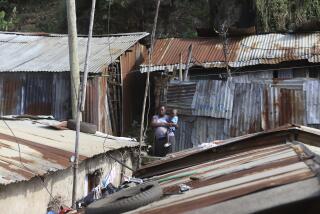Charity Brings Gift of Sight to the Poor
- Share via
KITUI, Kenya — Shaking as much from the strain of climbing as from anxiety about the unknown, elderly peasants with filmy eyes let Dr. Fayaz Khan guide them onto vans that will take them away from their homes in this dry, dusty farming region.
But Muteki Muma isn’t afraid. The doctor from Nairobi is offering the nearly blind widow a miracle--a free operation to remove the cataract from her right eye.
Muteki had always lived off her land in this bleak area. But when sight in her one good eye started failing two years ago, she could no longer gather firewood, tend cattle or cultivate her fields.
“I can’t be afraid because I want to see,” Muteki says, a gap-toothed smile rising on her weathered face. “I have seen others come back with sight, and I think it’s a miracle.”
Each year 15,000 people like Muteki join the ranks of the estimated 150,000 Kenyans who are blind from cataracts, a correctible condition. Most are in remote areas where disease abounds, health care is negligible and life is almost unlivable without sight.
The U.N. World Health Organization says about 40 million people worldwide have lost their sight, 80% of them from blindness that was preventable or could be reversed with proper medical care.
In Kitui, 80 miles east of Nairobi, Kenya’s capital, dust from dry fields and smoke from indoor cooking fires aggravate eye problems, says Khan, chief ophthalmologist at SightFirst Hospital in Nairobi.
Supported by Lions Clubs International, the hospital runs a mobile eye clinic that comes to Kitui once a month on its four-district circuit, finding and treating people with sight problems.
Most blindness in Kenya is caused by cataracts, but there are also many cases of trachoma, nutritional deficiency, ocular trauma, infection or glaucoma.
Muteki, who says she was born sometime during World War I, lost sight in her left eye to infection a decade ago. When her right eye began clouding from a cataract two years ago, she says she resigned herself to blindness.
“It’s so very easily preventable,” Khan says while peering into the eyes of a cataract victim in Kitui. “But the economic states of the patients are so poor that it is more important to them to get food and children’s clothing than to bring an old woman to the hospital.”
SightFirst Hospital, which is part of a global Lions Clubs initiative, has performed cataract surgery on 2,400 patients since it opened in June 1997, more than half of them in the last year.
As the hospital increases capacity and brings in more private patients to offset the charity work, it ultimately aims to perform 4,000 cataract operations a year.
Once a week, after the screening clinic, surgeons spend a day in the operating room in Nairobi replacing lenses of cataract-stricken patients in a 15-minute procedure that costs Lions Clubs $110 each.
After bringing 40 Kitui patients to the hospital, Khan and two other doctors spend the day operating on them three at a time, while the others wait to be called.
The next day, patients with white patches over one eye walk buoyantly through the corridors, many laughing and greeting doctors heartily.
When a nurse pulls off her bandage, Muteki marvels at her surroundings in the women’s ward and laughs with the anticipation of seeing her grandchildren and getting back to work.
Across the ward, Mukai Munyoke flashes a smile. “I feel like jumping up and down,” she says.
Completely blind for four years, Mukai couldn’t even walk without help. She had to stop her maize-selling business, and she has never seen her youngest grandchild.
“I was waiting for death. There was nothing for me,” she says. “Now life has come back.”
More to Read
Sign up for Essential California
The most important California stories and recommendations in your inbox every morning.
You may occasionally receive promotional content from the Los Angeles Times.













